|
|
Post by dem on Apr 10, 2020 18:09:27 GMT
Marvelous Kev. Please tell me where I can read that comic! Poor Olga! Sounds as if nobody told her a one-off rendition of "Peg of my heart" was going to be a special feature of her final curtain-call. cheers, Steve The story is One Last Fling from Vault of Horror#21, 1951, if that's any help. Happy hunting .... |
|
|
|
Post by dem on Apr 14, 2020 17:41:50 GMT
***************
Chicago Sun Times, Friday May 23, 1980
|
|
|
|
Post by dem on Apr 20, 2020 18:13:36 GMT
Terence Merchant - The Show Must Go On: (Dave Hughes [ed.], Skeleton Crew V, 1989). Didn't get much from this one, but on basis that they all count. Kate believes herself to be alone on-stage in the old Varsity Theatre, but what's that persistent scraping sound? Perhaps its mice. One consolation: it can't be a razor-wielding maniac dragging a schoolboy under the spotlight. I mean, that would be just too unlikely.
Henrietta Blake - The Stage: (Count Dracula Fan Club Bi-annual, Fall-Winter, 1979). Lieutenant Lloyd interviews actress Margaret Ferris, female lead in a long-running vampire play, two of whose cast have been stabbed with and exsanguinated by ghoul unknown. Who is behind this atrocity? What can it all mean?
|
|
|
|
Post by dem on Jun 4, 2020 18:52:06 GMT
The Scottish Play 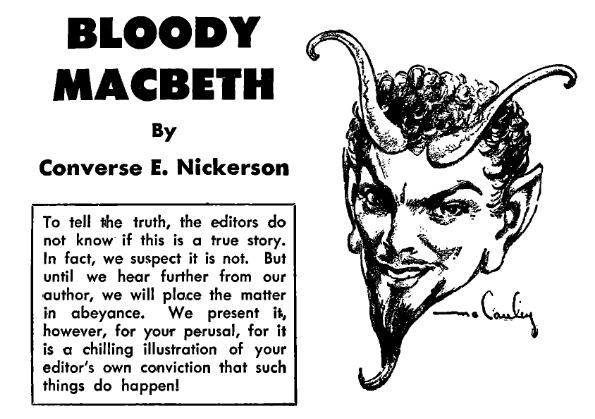 McCauley McCauley: ( Mystic Magazine, Oct. 1954). A performance of MacBeth at the Cheltingham theatre ("about fifty miles from London.") Rumour has it that, some years ago, MacFeelan, the stage manager, murdered Valbegan, the great dramatic star, in a fit of frenzy. Tonight the ghost of his victim returns with a phantom troupe to take bloody revenge. Alison Prince - Nathan's True Self: (Jean Richardson [ed.] Cold Feet, 1985). August Derleth - Lady Macbeth Of Pimley Square: ( Weird Tales, July 1944). Tim Stout - Daddy's Gone A-Fighting: ( The Doomsdeath Chronicles, 1980). Marc Laidlaw - Mars Will Have Blood: (Graham Masterton [ed.] Scare Care, 1989). Julia Birley - The Understudies: (Richard Davis [ed.] - Spectre 4, 1977). |
|
|
|
Post by dem on Nov 24, 2020 11:20:36 GMT
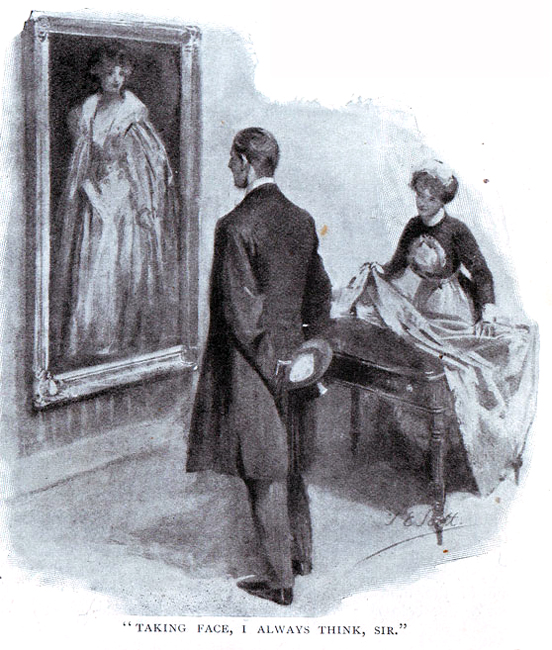 S. E. Scott S. E. Scott: ( The Strand, Dec. 1909). The late Reginald Maskelyne, genius architect, nursed a secret hatred of the acting profession and those who encourage it on account of a leching thespian ruined his only daughter. The cad in question now manages the Arena theatre in West London, a magnificent venue designed by Maskelyne at the height of his powers. The architect can't resist leaves a posthumous message explaining how, even in death, he's more than capable of bringing the house down. Non-supernatural nastiness with love story thrown in (the nominal hero and heroine are only hours wed when they learn of Maskelyne's diabolical scheme. 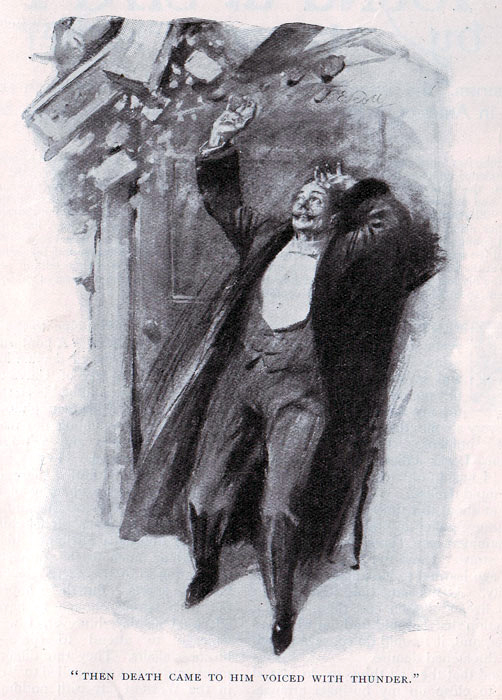 S. E. Scott S. E. Scott |
|
|
|
Post by dem on Jan 20, 2021 12:32:10 GMT
Do you remember the Broadway favorite, Horror House? Here is the weird story back of its first night of presentation - a story that has never been told until now!Mark Shadow [Robert W. Sneddon] - The Thing in the Theater: ( Ghost Stories, Jan. 1931). The players whispered about a jinx on the show - but no-one guessed the horrible truth until the night when a dying actor crossed rapiers with a phantom! The sheeted ghost of a murdered player plagues a hit Broadway thriller, most notably during the scene where the male lead, Carver Jones, lifts the lid of a sarcophagus in the vampire's crypt. What can it all mean? The ghost-hunting narrator and trusty Man Friday investigate. "I mean to spend the night here with Maurice. ... I noticed a comfortable-looking couch in the first act. If we get sleepy, we can make out somehow." Illustration provides shrewd idea of what they are to witness.
|
|
|
|
Post by dem on Sept 25, 2021 9:14:36 GMT
Connie Spears - Stage Door Secrets: Missus Mooney's Halfpenny Dreadfuls: John Hughes, committed to the Bethlehem Asylum as a boy after witnessing his father's death on the gallows, escapes from his cell into a tunnel linking the madhouse to a theatre where his father worked as a stagehand and his mother was an actress. Hughes senior was convicted of the murder of a love rival, Charles Watts, though could it be there was a miscarriage of duty, and a third party, an actor, killed Watts and framed John's dad to get at the woman he lusted? Presence of young actress, Mary Conley, provides a focus for the fugitive's voyeurism. Ian Taylor – Behind A Painted Smile; ( 5th BHF Book of Horror, 2021). Psycho panto dame versus chorus girl.
|
|
|
|
Post by David A. Riley on Sept 25, 2021 9:34:12 GMT
I recently reviewed a collection of stories by L. H. Maynard which are all about the theatre and the supernatural: Beyond the Curtain: Uncanny Tales of the Theatre. My review was first published in the last issue of Phantasmagoria magazine and, as it happens, will be read out tomorrow on Trevor Kennedy's weekly show on Big Hits Radio UK, which takes place every Sunday between 12 noon and 2 pm.  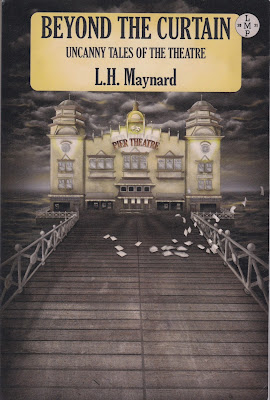 Here, in any case, is a copy of my review: BEYOND THE CURTAIN: UNCANNY TALES OF THE THEATRE by L. H. Maynard £6.99 paperback; £1.99 Kindle Published by LMP, 234 pages This is the first collection of stories by L. H. Maynard I have ever read. I am unfamiliar with his name, though his stories are so well-written I am surprised I haven’t come across him before. In his introduction he says that he has been writing for over fifty years. Beyond the Curtain contains five stories: “The Business of Barbarians”, “At the End of the Pier”, “Another Bite of the Cherry”, “An Office in the Grays Inn Road”, and “Double Act”, the last of which is possibly my favourite, bringing the collection to a satisfying if sad conclusion. Set in an extremely well realised 1950s or early 1960s, these tales of the supernatural are centred around theatres and theatrical life, from struggling young actors, down-at-heel theatre managers, unscrupulous “big names”, theatrical agents to comedy duos, many of which used to tread the boards in those far off days, grittily depicting poor digs run by eccentric landladies and rundown piers in even more rundown seaside resorts. Maynard gives me the impression he has had a more than passing acquaintance with that world – and has researched it well, filling his tales with numerous references to stars of that bygone time: Arthur Askey, Max Wall, Max Bygraves, Bob Monkhouse, Galton and Simpson, and Eric Sykes. And no shortage of other details that set the timeframe to perfection without being pedantic. Maynard has a leisurely style which I found easy to read and which helped to develop not only the characters of his protagonists but also the world in which they lived, giving the stories a bleak kitchen sink air of reality. Several times I was reminded of that Olivier movie The Entertainer with his opportunistic womanising comedian Archie Rice. Rice would have fitted so well into many of these tales! I became so engrossed in these stories, especially their build up, that I almost regretted it when the supernatural element began to emerge. Not that these are not splendidly conceived – nor for the faint-hearted! These are, in the main, dark tales, vividly detailed and flowingly written. And I enjoyed every one of them. Beyond the Curtain: Uncanny Tales of the Theatre is available from amazon. And at only £6.99 is a definite bargain. |
|
|
|
Post by andydecker on Sept 25, 2021 10:43:57 GMT
You caught my interest there. I really loved Reggie Oliver's theatre circuit stories and they set a high standard. So I am a bit jaded, I guess. But this sounds promising.
|
|
|
|
Post by jamesdoig on Sept 26, 2021 0:56:59 GMT
This is the first collection of stories by L. H. Maynard I have ever read. I am unfamiliar with his name, though his stories are so well-written I am surprised I haven’t come across him before. I think that must be Len Maynard who back in the day used to write a lot of ghost stories and supernatural tales with Mick Sims - I think they did a couple of early Sarob Press collections together, as well as edit various anthologies and ghostly magazines. I read the Black Cathedral by him (or was that a collaboration too?), which wasn't bad. |
|
|
|
Post by andydecker on Sept 26, 2021 12:49:24 GMT
I recently reviewed a collection of stories by L. H. Maynard which are all about the theatre and the supernatural: Beyond the Curtain: Uncanny Tales of the Theatre. Beyond the Curtain contains five stories: “The Business of Barbarians”, “At the End of the Pier”, “Another Bite of the Cherry”, “An Office in the Grays Inn Road”, and “Double Act”, the last of which is possibly my favourite, bringing the collection to a satisfying if sad conclusion. Maynard has a leisurely style which I found easy to read and which helped to develop not only the characters of his protagonists but also the world in which they lived, giving the stories a bleak kitchen sink air of reality. As I had nothing better to do, I bought and read it. You are 100% right, David. This is very smoothly written, the pages just flow. It is a joy to read. But as far as the content is concerned, I see it rather different. Mostly I was disappointed. To be clear, I had no high expectations to begin with, no new invention of the wheel here, but decent stories which make most of its theme. But at the end I thought most of the stories just didn't work. Which is a shame, because it mostly was nothing which a good editor couldn’t or shouldn't have fixed. The Business of Barbarians, the first story, just didn't work. Some of the narrative didn't made sense in the context of the story or was just unbelievable in said context. This was a pity because it could have been a nice story. {Spoiler}There was too much of it to list all of it, but for instance it doesn't makes sense if your villain grooms a victim for months to be the vessel for the ghost – and you build suspense with this because the action of said victim is the plot-point on which the whole story depends -, and the next girl kidnapped from the street an hour before the ceremony is just as good a vessel. And this is just one of the problems of this tale. Another Bite of the Cherry is basically a Mummy story. This was even more of a disappointment. I had no problem that it was only going through the motions and the plot was a rehash of countless other Mummy stories and movies, but it was a shame that the one interesting, wholly original idea here – the Tableau vivant on the stage, indeed a piece of British variety history (I read it up because unfortunately the writer thought it unnecessary to give it a bit background in the text) - was wasted. It had nothing to do whatsoever with the plot. The background could just as easily have been a department store or a restaurant, it wouldn't have changed anything in the narrative. Which IMHO made this a failure. Also in my opinion a period piece needs a bit more than a bit of name-dropping to achieve a solid historical atmosphere. Unlike you I thought that there was a shortage of period details. I know it is a matter of taste how much is enough, but this could have been handled better, and I am not talking of pages of exposition or clumsy insertion of things like headlines or the politics of the day. The best story of this collection is indeed Double Act, no question asked. While again the period i.e. the variety background was too vague for my taste, it was a genuine mystery with some well-realized scenes, a for once very well-realized ending and some heartfelt and relatable characterisation. A very well written story. It gripped me from the start and I wanted to know how it ends. |
|
|
|
Post by dem on Sept 26, 2021 16:30:03 GMT
Manly Wade Wellman - The Black Drama: Judge Keith Hilary Pursuivant investigates a sinister production of Lord Byron's lost play, Ruthven. Have just read it for the first time in Stephen Jones' Mammoth Book of Terror and agree, it's a must. "Luna, my mother, fountain of my life,
Once more thy rays restore me with their kiss,
Grave, I reject thy shelter! Death, stand back ..."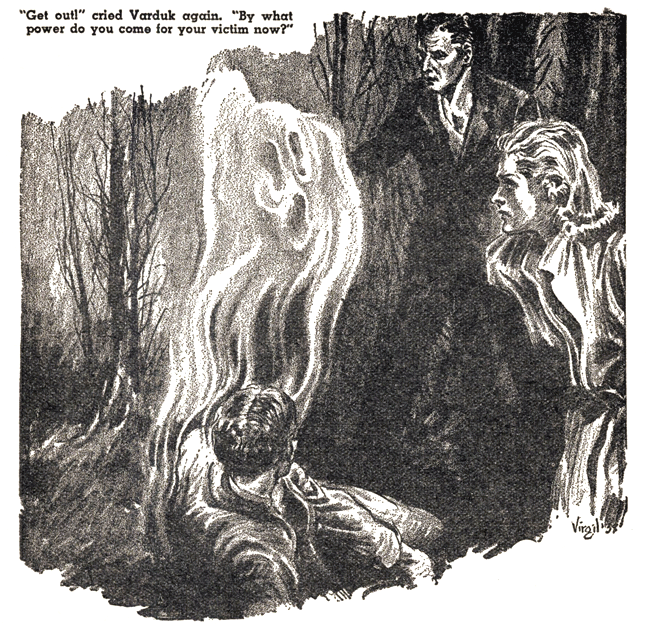 Virgil Finlay Virgil Finlay: ( Weird Tales, June/ July/ Aug. 1938). An eldritch tale about the eery personalty called Varduk — a tale of Lord Byron. Fallen Hollywood idol, Gilbert 'Gib' Connatt, is reunited with his ex, Sigrid Holgar, for a staging of the Wicked Lord Byron's "lost" vampyre drama, Ruthven. Since parting, the lovers' careers have gone in opposite directions, with Sigrid hot property and Gib scraping for work. His agent, Jake Switz, assures him that this time they have a sure-fire hit on their hands, not least due to the efforts of genius producer, Varduk, man of mystery, who, incidentally unearthed the manuscript. Judge Keith Hilary Pursuivant, antiquary, occultist, and author ( The Unknown that Terrifies, Cannibalism in America, Vampyricon, An Indictment of Logic, A Defense of the Wickedest Poet, & Co.), is consulted to approve the authenticity of the document. He confides in Gib that, while the MS was unquestionably penned by Byron, the paper it is written on is no more than ten years old. Ruthven is to premier at the Lake Jozdig Summer Theatre, in the New York forest. Prior to first rehearsal, Sigrid and Jake are set upon by amorphous entities as they take a stroll through the trees. Varduk arrives on the scene, commands the unearthly assailants "Get out! By what power do you come for your victims now?" whereupon they shrink back into the bushes and vanish from sight. Without another word he sets off back to the theatre. Rehearsals are underway. Appearing alongside Varduk (as the vampyre), Miss Holgar (Mary) and Connatt (Aubrey/ Swithin) are Martha Vining, a veteran character actress, and Elmo Davidson, Varduk's valet with whom he seems to have a techy relationship. Goaded by Varduk to put more effort into his swordplay, Gib slips and accidentally pierces his chest a deep wound. Varduk insists there is no damage, he applied blood capsules beneath his shirt beforehand. The explanation fails to convince. Davidson informs Pursuivant and Connatt that he has known, and involuntarily served Vathuk in a Man Friday capacity since college days where the enigmatic and sinister director 'persuaded' a bullying Jock to take a leap through the window of a tall building. He is adamant that Vathuk is possessed of strange and terrible powers and not to be trifled with. As if to emphasise the point, the Judge is attacked and rendered unconscious by the elementals immediately afterward. Only his sacred silver cane-sword saves him. Now the first night is upon us, and Pursuivant has established that Varduk has something diabolical in mind for our heroine. Truly this one-off performance of Ruthven shall see a climax the audience will never forget. |
|
|
|
Post by dem on Oct 1, 2021 8:42:08 GMT
Manly Wade Wellman - Chastel: (Gerald W . Page [ed.], Years Best Horror VII, 1979). Judge Keith Hilary Pursuivant, now 87 years young, teams up with black magic buster Lee Cobbett ( A Witch for All Seasons as by Gans T. Field, Witchcraft & Sorcery #9, Jan 1973), to deprive Phil Drumm's summer production of The Land Beyond the Forest of it's lead vampiress, Gonda Chastel. The glamorous Miss Chastel is supposedly the daughter of the lost love of Pursuivant's life (and "the reason why I never married"), who is buried in the cemetery at Deslow, Connecticut. After a number of fanged face at the window episodes, the Judge and Cobbett track 'Gonda' to her grave. She is blissfully grateful to the beau of her youth for bringing an end to her bloodlust with his trusty silver sword of St. Dunstan.
|
|
|
|
Post by humgoo on Apr 26, 2022 11:47:43 GMT
Steve Duffy - The Woofle Dust (Supernatural Tales #49, Spring 2022, [ed.] David Longhorn): The eve of WW2. End-of-pier theatre. Seaside strangler. The final act of a magician. It really has everything. Mr. Duffy is (again) on top form.
Read by Mr. Longhorn, who has also recorded many other contemporary and old tales (the latest are those by L.T.C. Rolt):
|
|
|
|
Post by dem on Jun 11, 2023 12:58:31 GMT
|
|